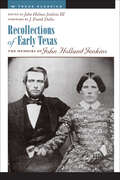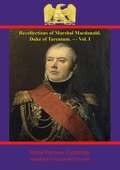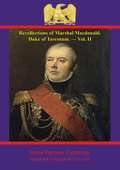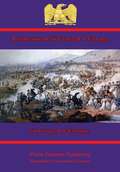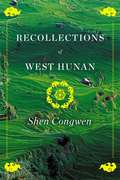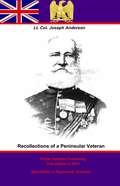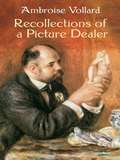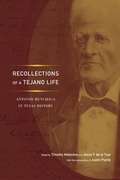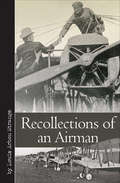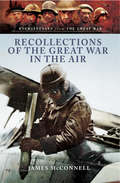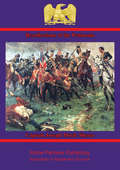- Table View
- List View
Recollections and Letters of General Robert E. Lee
by Robert E. LeeGeneral Robert E. Lee was the most heroic figure of the Civil War, but to many, he is a solitary figure. This book fleshes out the man and reveals the workings of a great military mind and a warm, understanding, and generous human being. It shows all the facets of the general during the war; at the conclusion, when he was an outspoken proponent of a reasonable peace which would allow the South to rejoin the Union; and after the war, when he served as president of Washington College, and became a driving force for the creation of a viable educational system. This anthology shows all these facets of the general, through his correspondence and through the revealing insight supplied by his son. No other collection of source materials gives such a whole and rewarding picture of one of the South's greatest sons and heroes.
Recollections of Early Texas: Memoirs of John Holland Jenkins (Personal Narratives of the West)
by John Holland Jenkins&“[A] firsthand account by one who measured up to the demands of danger and hardships and lived to write about it . . . Invaluable . . . Well documented.&” —Library Journal As a teenager in the 1950s, John Holmes Jenkins set to work on collecting and editing his great-great-grandfather&’s writings about his experiences on the Texas frontier. John Holland Jenkins joined General Sam Houston&’s army at age thirteen after losing his stepfather at the Alamo. In addition to fighting the Mexicans, he faced peril from Indian warriors as well as the everyday difficulties of pioneer life. His reports on the events of the time were included in newspapers with very small readerships—and, his descendant would discover, were sometimes used word-for-word in respected history textbooks without any credit given to the source. This volume includes these memoirs of the Texas Republic and early statehood, along with illustrations, notes, biographical sketches, a bibliography, and an index. &“Fascinating . . . A commendable job.&” —The New York Times &“[These reminiscences] light up for whoever will read the earliest days of early English-speaking Texas.&” —J. Frank Dobie, from the foreword
Recollections of Marshal Macdonald, Duke of Tarentum. — Vol. I (Recollections of Marshal Macdonald, Duke of Tarentum #1)
by Camile Rousset Marshal Etienne-Jacques-Joseph-Alexandre Macdonald, Duc de Tarente Stephen Louis SimeonThe dignity of Marshal of France was to be the apogee of success for any general in Napoleonic France, since the Emperor only created 26 during his years on the throne. Fame, riches and high station in the Imperial Court were the bountiful reward for hard service on the battlefield. Napoleon handed out these dignities, along with kingdoms, principalities, admiralties, dukedoms for more than purposes of recognition; they were also to bind the recipient to his empire even more tightly. Marshal Macdonald was not a man to be flattered or bought; he was of Scottish descent and held his own views. His memoirs bear this imprint of forthright opinion, which had led him into trouble with the Emperor, but such was his value on the battlefield he was courted again by Napoleon.Marshal Macdonald fought all across Europe, particularly at the battle of Jemappes in the Revolutionary armies on the Rhine. He fought well under Napoleon's eagles in Spain, Russia, Germany and France itself. Outstanding at the battle of Wagram, his attack on the Austrian centre, for which he became the only man to be made marshal on the field of battle by Napoleon, clinched the day. Never wholly Napoleon's man, he was a prime mover in forcing his master's abdication in 1814 and refused to rejoin him in 1815.This first volume Marshal Macdonald recounts his life up to and including the battle of Wagram in 1809. Author - Marshal Macdonald, Etienne-Jacques-Joseph-Alexandre, Duc de Tarente, 1765-1840.Editor - Rousset, Camille, 1821-1892.Translator - Simeon, Stephen Louis, 1857-1937Text taken, whole and complete, from the edition published in 1892, London, by Richard Bentley and Son.Original Page Count - 355 pages.
Recollections of Marshal Macdonald, Duke of Tarentum. — Vol. II (Recollections of Marshal Macdonald, Duke of Tarentum #2)
by Camile Rousset Marshal Etienne-Jacques-Joseph-Alexandre Macdonald, Duc de Tarente Stephen Louis SimeonThe dignity of Marshal of France was to be the apogee of success for any general in Napoleonic France, since the Emperor only created 26 during his years on the throne. Fame, riches and high station in the Imperial Court were the bountiful reward for hard service on the battlefield. Napoleon handed out these dignities, along with kingdoms, principalities, admiralties, dukedoms for more than purposes of recognition; they were also to bind the recipient to his empire even more tightly. Marshal Macdonald was not a man to be flattered or bought; he was of Scottish descent and held his own views. His memoirs bear this imprint of forthright opinion, which had led him into trouble with the Emperor, but such was his value on the battlefield he was courted again by Napoleon.Marshal Macdonald fought all across Europe, particularly at the battle of Jemappes in the Revolutionary armies on the Rhine. He fought well under Napoleon's eagles in Spain, Russia, Germany and France itself. Outstanding at the battle of Wagram, his attack on the Austrian centre, for which he became the only man to be made marshal on the field of battle by Napoleon, clinched the day. Never wholly Napoleon's man, he was a prime mover in forcing his master's abdication in 1814 and refused to rejoin him in 1815.This second volume Marshal Macdonald recounts his experiences up to the fall of Napoleon in 1815. Title - Recollections of Marshal Macdonald, Duke of Tarentum. -- Vol. IISeries Name - Recollections of Marshal Macdonald, Duke of Tarentum.Series Number --2Author - Marshal Macdonald, Etienne-Jacques-Joseph-Alexandre, Duc de Tarente, 1765-1840.Editor - Rousset, Camille, 1821-1892.Translator - Simeon, Stephen Louis, 1857-1937Text taken, whole and complete, from the edition published in 1892, London, by Richard Bentley and Son.Original Page Count - 328 pages.
Recollections of My Nonexistence: A Memoir
by Rebecca Solnit"An un-self-centered book . . . At the same time that [Solnit] describes her forays into her past, she invites us to connect pieces of her story to our own, as a measure of how far we've come and how far we have left to go." --Jenny Odell, The New York Times Book Review An electric portrait of the artist as a young woman that asks how a writer finds her voice in a society that prefers women to be silentIn Recollections of My Nonexistence, Rebecca Solnit describes her formation as a writer and as a feminist in 1980s San Francisco, in an atmosphere of gender violence on the street and throughout society and the exclusion of women from cultural arenas. She tells of being poor, hopeful, and adrift in the city that became her great teacher, and of the small apartment that, when she was nineteen, became the home in which she transformed herself. She explores the forces that liberated her as a person and as a writer--books themselves; the gay community that presented a new model of what else gender, family, and joy could mean; and her eventual arrival in the spacious landscapes and overlooked conflicts of the American West. Beyond being a memoir, Solnit's book is also a passionate argument: that women are not just impacted by personal experience, but by membership in a society where violence against women pervades. Looking back, she describes how she came to recognize that her own experiences of harassment and menace were inseparable from the systemic problem of who has a voice, or rather who is heard and respected and who is silenced--and how she was galvanized to use her own voice for change.
Recollections of Sir George B. L’Estrange
by Sir George B. L’estrangeThis ebook is purpose built and is proof-read and re-type set from the original to provide an outstanding experience of reflowing text for an ebook reader. Sir George L'Estrange was only an ensign when he started on his Peninsular career in the 31st or Huntingdonshire Regiment of Foot, joining the war in 1812. Arriving in Portugal and meeting with his cousin, who had escaped from French capture at Verdun, Sir George recounts his cousin's story before returning to his own narrative and his first major engagement at the battle of Vittoria in 1813. His experiences of the fighting after Vittoria until the end of the war make up the majority of the book: encompassing snow-bound bivouacs in the Pyrenees; hard fighting at Orthez; and his trials at the forefront of the fighting. The finale details various anecdotes that he must have heard from brother officers whilst on duty in Spain and Portugal. A solid memoir with much to recommend it to the reader. Title - Recollections of Sir George B. L'Estrange Sub-Title - Late of the 31st Regiment, and Afterwards of the Scots Fusilier Guards Author -- Sir George B. L'Estrange (1796-1878) Text taken, whole and complete, from the edition published in 1874, London, by Marston, Low, & Searle. Original - viii and 280 pages. Illustrations - one portrait and 8 illustrations.
Recollections of Virginia Woolf by Her Contemporaries
by Joan Russell NobleA landmark study of Virginia Woolf, now back in printRecollections, anecdotes and first-hand impressions--including pieces from some of the leading lights of the Bloomsbury Group--are gathered together in this perceptive and profound volume. Many pieces were specially written for the original edition of this book, including work by Duncan Grant, Rebecca West, and T.S. Eliot, while perhaps its most famous piece--by a member of her household staff--movingly describes her on the day of her death. From all these reminiscences, a composite and complex portrait of the artist emerges, one that no fan of her writings should be without.
Recollections of West Hunan
by Shen CongwenRecollections of Western Hunan is a collection of the letters and essays of Chinese novelist Shen Congwen. Describing his childhood and life in Western Hunan between 1902 and 1937, this collection paints a vivid picture of both the idyllic beauty and turmoil of life in a province once known as the "bandit area," a countryside shrouded in mystery, mysticism, and chaos.
Recollections of a Peninsular Veteran
by Pickle Partners Publishing Captain Acland Anderson Lt.-Colonel Joseph Anderson C.B. K.H.This ebook is purpose built and is proof-read and re-type set from the original to provide an outstanding experience of reflowing text for an ebook reader. Lt. Col, Anderson wrote his memoirs as for his own family not suspecting their interest to the larger reading public. As such they hold a charm of their own apart from a number of the more swashbuckling accounts of soldier's adventures in the British army during the Napoleonic and Victorian periods. That is not to say that they are staid in any way but written from a more modest view-point than some. Joining the British army at the tender age of fifteen as an ensign in the 78th Regiment of Foot, he took part on the clash at Maida in which an out-numbered British force decisively defeated the French division of General Reynier. Posted to the main Peninsular theatre of war, he took part on the battles of Talavera, Busaco and Fuentes d'Oñoro. A humane and reasonable man capable of great bravery, such as going into French lines to recover the body of his dead friend, Anderson's memoirs have deserved a greater audience than the circle of his family and were duly published after his death. Text taken, whole and complete, from the 1913 edition published in London by Edward Arnold, Original 330 pages. Author - Lt.-Col Joseph Anderson C.B. K.H. 01/06/1790 - ??/01/1877 Foreword - Captain Acland Anderson ????-????
Recollections of a Picture Dealer
by Ambroise VollardCelebrity, art merchant, socialite, publisher, and writer, Ambroise Vollard (1867-1939) was one of the most extraordinary figures in 20th-century art. He possessed an uncanny ability to recognize genius in painters -- dozens of important artists received valuable commissions and gallery space with his help, and his galleries presented the first one-man shows for such luminaries as Matisse, Cézanne, and Picasso. Vollard's warmth, candor, and intelligence earned him the friendship of a generation of artists and make this memoir an enthralling and often hilarious account of an exciting Golden Age of painting.Vollard's anecdotal recollections transport the reader to Paris at the turn of the 20th century and the legendary "Street of Pictures," the rue Laffitte, where Vollard lived and worked. Rather than critiquing artists or esthetic movements, Vollard focuses on the human sidelights that made his life as picture dealer so rich and fascinating: his early efforts to sell the works of Cézanne, despite incredible opposition to Impressionism; his dinner parties, whose guests included Renoir, Forain, Degas, Redon, and Rodin; his many portrait sittings for Cézanne, Renoir, Rouault, Bonnard, Forain, and Picasso; his observation on the studios, habits, and personalities of Manet, Matisse, Picasso, de Groux, Signac, and Rousseau; and his encounters with Gertrude Stein, Alfred Jarry, Guillaume Apollinaire, Mallarmé, and Zola.
Recollections of a Tejano Life: Antonio Menchaca in Texas History
by Jesús F. de la Teja Timothy MatovinaSan Antonio native, military veteran, merchant, and mayor pro tem José Antonio Menchaca (1800–1879) was one of only a few Tejano leaders to leave behind an extensive manuscript of recollections. Portions of the document were published in 1907, followed by a “corrected” edition in 1937, but the complete work could not be published without painstaking reconstruction. At last available in its entirety, Menchaca’s book of reminiscences captures the social life, people, and events that shaped the history of Texas’s tumultuous transformation during his lifetime. Highlighting not only Menchaca’s acclaimed military service but also his vigorous defense of Tejanos’ rights, dignity, and heritage, Recollections of a Tejano Life charts a remarkable legacy while incorporating scholarly commentary to separate fact from fiction. Revealing how Tejanos perceived themselves and the revolutionary events that defined them, this wonderfully edited volume presents Menchaca’s remembrances of such diverse figures as Antonio López de Santa Anna, Jim Bowie, Davy Crockett, Sam Houston, General Adrián Woll, Comanche chief “Casamiro,” and Texas Ranger Jack Hays. Menchaca and his fellow Tejanos were actively engaged in local struggles as Mexico won her independence from Spain; later many joined the fight to establish the Republic of Texas, only to see it annexed to the United States nine years after the Battle of San Jacinto. This first-person account corrects important misconceptions and brings previously unspoken truths vividly to life.
Recollections of an Airman (Vintage Aviation Library)
by Louis Arbon StrangeThis candid WWI memoir takes readers inside the cockpit with an RAF officer on the Western Front from the outbreak the Great War until its end in 1918. Louis Arbon Strange was at the Royal Air Force&’s Central Flying School when war broke out in 1914. He immediately reported to Royal Flying Corps headquarters and joined No. 5 Squadron. Strange remained on active duty throughout the war, serving his country over the Western Front from August of that year until the enemy&’s surrender. Strange transferred to No. 6 Squadron in 1915 and went on to form and command No. 23 Squadron. Due to illness, he did not accompany his squadron to France, but spent that time training others. He took charge of the Machine-Gun School at Hythe and other schools of aerial gunnery before returning to the Front. There he commanded the 23rd Wing and finally took command of the 80th Wing from June 1918 until the end of the war. As Strange chronicles his experiences, he provides unique insight into how and why the Allied airmen eventually prevailed.
Recollections of the Great War in the Air: Recollections Of The Great War In The Air (Eyewitnesses from The Great War)
by James McConnell&“The memoir of . . . an American pilot flying with the famous French Flying Corps&’ American Layfayette Escadrille and provides a unique personal insight.&”—Firetrench In 1915 James Roger McConnell enlisted as a US volunteer in the French Flying Corps. He was part of a remarkable band of American volunteers which were formed into the famous Lafayette Escadrille, which was then based at Verdun. This book brings his personal account of the war, Flying for France, to a new generation of readers. His memoirs produce an amazing insight into the early aerial battles and trace the evolution of aerial warfare as the rickety aircraft of 1915 rapidly evolved into the purpose-built fighters of 1917. Casualties among the American Escadrille were very high and McConnell&’s own luck finally ran out when he was ambushed by two German fighters and was killed in action in March 1917. His gripping and detailed memoir of the war is his lasting memorial; his honest account of the everyday life of a pilot in the Great War is matched only by Sagittarius Rising. However, his dramatic description of the battlefield of Verdun viewed from above is one of the classic descriptions of any wartime memoir and is unmatched by any other Great War writer. &“Resurrects an important part of the first-person literature of the Lafayette Escadrille. A long-lost gem.&”—Over the Front &“The memoir and letters give a surprising amount of detail about the pilot&’s life and tactics employed. McConnell&’s story is certainly an interesting one and this is a short and easily digestible introduction to the life of a First World War pilot.&”—WW1 Geek
Recollections of the Peninsula
by Captain Joseph Moyle ShererThis ebook is purpose built and is proof-read and re-type set from the original to provide an outstanding experience of reflowing text for an ebook reader. Captain Sherer's record of service in the Peninsular War is second to none. A hard campaigner, he served with the 34th Foot at Busaco, Badajoz, Albuera, Arroyo Molinos, Vittoria and the Pyrenees, during which he was taken prisoner by the advancing French. In this, his service was no different to huge numbers of officers, a good number of whom left their memoirs to posterity. What marks out Sherer and his recollections is their quality. His descriptions of himself, his men and, above all, the actions that he took part in are of the first order, quoted with great frequency by historians - an example of which is below (from his description of the hard fighting at Albuera): 'The French grenadier caps, their arms, and the whole aspect of their frowning masses. It was a momentary, but grand sight: a heavy atmosphere of smoke again enveloped us, and few objects could be discerned at all, none distinctly... This murderous contest of musketry lasted long. We were the whole time progressively advancing and shaking the enemy. 'At a distance of about twenty yards from them we received orders to charge; we had ceased firing, cheered, and had our bayonets in the charging position, when a body of the enemy's horse was discovered under the rising ground, ready to take advantage of our impetuosity. Already, however, the French infantry, alarmed by our preparatory cheers, which always indicate the charge, had broke and fled.' A fantastic memoir that deserves reading and re-reading. Title - Recollections of the Peninsula Author -- Captain Joseph Moyle Sherer (1789-1869) Text taken, whole and complete, from the fifth edition published in 1827, London, by Longman, Rees, Orme, Brown and Green. Original - 358 pages.
Recollections of the Private Life of Napoleon -- Volume 01
by Louis Constant WairypubOne. info present you this new edition. Though this work was first published in 1830, it has never before been translated into English. Indeed, the volumes are almost out of print. When in Paris a few years ago the writer secured, with much difficulty, a copy, from which this translation has been made. Notes have been added by the translator, and illustrations by the publishers, which, it is believed, will enhance the interest of the original work by Constant.
Recollections of the Private Life of Napoleon -- Volume 02
by Louis Constant WairypubOne. info present you this new edition. In the month of May, 1801, there came to Paris, on his way to take possession of his new kingdom, the Prince of Tuscany, Don Louis the First, whom the First Consul had just made King of Etruria. He traveled under the name of the Count of Leghorn, with his wife, who was the infanta of Spain, Maria Louisa, third daughter of Charles the Fourth; but in spite of the incognito, which, from the modest title he had assumed, he seemed really anxious to preserve, especially, perhaps, on account of the poor appearance of his small court, he was, notwithstanding, received and treated at the Tuileries as a king. This prince was in feeble health, and it was said had epilepsy. They were lodged at the residence of the Spanish Embassy, formerly the Hotel Montessori; and he requested Madame de Montessori, who lived in the next house, to reopen a private communication between the houses which had long been closed. He, as well as the Queen of Etruria, greatly enjoyed the society of this lady, who was the widow of the Duke of Orleans, and spent many hours every day in her house.
Recollections of the Private Life of Napoleon -- Volume 03
by Louis Constant WairypubOne. info present you this new edition. The First Consul left Boulogne to return to Paris, in order to be present at the marriage of one of his sisters. Prince Camille Borghese, descendant of the noblest family of Rome, had already arrived at Paris to- marry Madame Pauline Bonaparte, widow of General Leclerc, who had died of yellow fever in San Domingo. I recollect having seen this unfortunate general at the residence of the First Consul some time before his departure on the ill-starred expedition which cost him his life, and France the loss of many brave soldiers and much treasure. General Leclerc, whose name is now almost forgotten, or held in light esteem, was a kind and good man. He was passionately in love with his wife, whose giddiness, to put it mildly, afflicted him sorely, and threw him into a deep and habitual melancholy painful to witness. Princess Pauline (who was then far from being a princess) had married him willingly, and of her own choice; but this did not prevent her tormenting her husband by her innumerable caprices, and repeating to him a hundred times a day that he was indeed a fortunate man to marry the sister of the First Consul.
Recollections of the Private Life of Napoleon -- Volume 04
by Louis Constant WairypubOne. info present you this new edition. It was the 2d of January, 1805, exactly a month after the coronation, that I formed with the eldest daughter of M. Charvet a union which has been, and will I trust ever be, the greatest happiness of my life. I promised the reader to say very little of myself; and, in fact, how could he be interested in any details of my own private life which did not throw additional light upon the character of the great man about whom I have undertaken to write? Nevertheless, I will ask permission to return for a little while to this, the most interesting of all periods to me, and which exerted such an influence upon my whole life. Surely he who recalls and relates his souvenirs is not forbidden to attach some importance to those which most nearly concern himself. Moreover, even in the most personal events of my life, there were instances in which their Majesties took a part, and which, from that fact, are of importance in enabling the reader to form a correct estimate of the characters of both the Emperor and the Empress.
Recollections of the Private Life of Napoleon -- Volume 05
by Louis Constant WairypubOne. info present you this new edition. I left the Emperor at Berlin, where each day, and each hour of the day, he received news of some victory gained, or some success obtained by his generals. General Beaumont presented to him eighty flags captured from the enemy by his division, and Colonel Gerard also presented sixty taken from Blucher at the battle of Wismar. Madgeburg had capitulated, and a garrison of sixty thousand men had marched out under the eyes of General Savary. Marshal Mortier occupied Hanover in the name of France, and Prince Murat was on the point of entering Warsaw after driving out the Russians.
Recollections of the Private Life of Napoleon -- Volume 06
by Louis Constant WairypubOne. info present you this new edition. We arrived in Paris on the 1st of January at nine o'clock in the evening; and as the theater of the palace of the Tuileries was now completed, on the Sunday following his Majesty's return the Griselda of M. Paer was presented in this magnificent hall. Their Majesties' boxes were situated in front of the curtain, opposite each other, and presented a charming picture, with their hangings of crimson silk draped above, and forming a background to broad, movable mirrors, which reflected at will the audience or the play. The Emperor, still impressed with the recollections of the theaters of Italy, criticised unsparingly that of the Tuileries, saying that it was inconvenient, badly planned, and much too large for a palace theater; but notwithstanding all these criticisms, when the day of inauguration came, and the Emperor was convinced of the very great ingenuity M. Fontaine had shown in distributing the boxes so as to make the splendid toilets appear to the utmost advantage, he appeared well satisfied, and charged the Duke of Frioul to present to M.
Recollections of the Private Life of Napoleon -- Volume 07
by Louis Constant WairypubOne. info present you this new edition. His Majesty remained only ten days at Saint-Cloud, passed two or three of these in Paris at the opening of the session of the Corps Legislatif, and at noon on the 29th set out a second time for Bayonne.
Recollections of the Private Life of Napoleon -- Volume 08
by Louis Constant WairypubOne. info present you this new edition. Towards the end of September the Emperor made a journey to Raab; and, as he was mounting his horse to return to his residence at Schoenbrunn, he saw the bishop a few steps from him. "Is not that the bishop? " said he to M. Jardin, who was holding his horse's head. "No, Sire, it is Soliman. "- "I asked you if that was not the bishop, " repeated his Majesty, pointing to the prelate. M. Jardin, intent on business, and thinking only of the Emperor's horse which bore the name of Bishop, again replied, "Sire, you forget that you rode him on the last relay. " The Emperor now perceived the mistake, and broke into a laugh. I was witness at Wagram of an act which furnished a fine illustration of the Emperor's kindness of heart and consideration for others, of which I have already given several instances; for, although in the one I shall now relate, he was forced to refuse an act of clemency, his very refusal challenges admiration as an exhibition of the generosity and greatness of his soul.
Recollections of the Private Life of Napoleon -- Volume 09
by Louis Constant WairypubOne. info present you this new edition. In September, 1811, the Emperor decided to make a journey into Flanders in company with the Empress, that he might personally ascertain if his orders had been carried out in all matters concerning both the civil and religious administration. Their Majesties left Compiegne on the 19th, and arrived at Montreuil-sur-Mer at nine o'clock in the evening. I accompanied the Emperor on this journey. I have read in O'Meara's Memorial that M. Marchand was at that time in the service of Napoleon. This is incorrect; for M. Marchand did not enter the Emperor's private service until 1814, at Fontainebleau. His Majesty at that time ordered me to select from the domestics of the service an intelligent young man to assist me in my duties near his person, since none of the ordinary 'valets de chambre' were to remain on the island of Elba. I mentioned the name of M. Marchand, son of a nurse of the King of Rome, as a suitable person for the place. He was accepted by his Majesty, and from that time M. Marchand formed a part of the private service of the Emperor.
Recollections of the Private Life of Napoleon -- Volume 10
by Louis Constant WairypubOne. info present you this new edition. During the whole Russian campaign, the Emperor was nearly always badly lodged. It was necessary, however, to accommodate himself to circumstances; though this was a somewhat difficult task to those who were accustomed to lodge in palaces. The Emperor accepted the situation bravely, and all his followers consequently did the same. In consequence of the system of incendiarism adopted as the policy of Russia, the wealthy part of the population withdrew into the country, abandoning to the enemy their houses already ruined. In truth, on the whole road leading to Moscow, with the exception of a few unimportant towns, the dwellings were very wretched; and after long and fatiguing marches, we were very happy if we found even a hut at the place the Emperor indicated as headquarters. The owners of these miserable hovels on quitting them left there sometimes two or three seats and wooden beds, in which were an abundant supply of vermin that no invasion could drive out. The least filthy place was chosen, which was usually the most airy; and we knew when the cold came, icy breezes would not fail us.
Recollections of the Private Life of Napoleon -- Volume 11
by Louis Constant WairypubOne. info present you this new edition. During the second day of the battle of Dresden, at the end of which the Emperor had the attack of fever I mentioned in the preceding chapter, the King of Naples, or rather Marshal Murat, performed prodigies of valor. Much has been said of this truly extraordinary prince; but only those who saw him personally could form a correct idea of him, and even they never knew him perfectly until they had seen him on a field of battle. There he seemed like those great actors who produce a complete illusion amid the fascinations of the stage, but in whom we no longer find the hero when we encounter them in private life. While at Paris I attended a representation of the death of 'Hector' by Luce de Lancival, and I could never afterwards hear the verses recited in which the author describes the effect produced on the Trojan army by the appearance of Achilles without thinking of Prince Murat; and it may be said without exaggeration that his presence produced exactly this effect the moment he showed himself in front of the Austrian lines.

